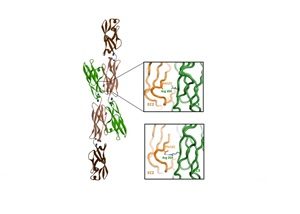 Dyslexia is a heritable neurodevelopmental disorder characterized by difficulties in reading and writing. In the present collaborative study, a strong correlation was observed between variations in the protocadherin gamma gene cluster and dyslexia in the members of one family.The protocadherins are trans synaptic molecules involved in cell-cell recognition in the human brain especially in the regions important for cognition and learning.The finding is novel since, this gene cluster has never been associated with dyslexia in the past. Interestingly, seven of the 17 dyslexia associated variations of protocardherin gamma gene had evolutionary characteristics and were also present in most of the primate species, including gorillas, chimpanzees and bonobos. Further, six of them were found to be present in Neanderthals. Four of these mutations are present in the coding region of the gene. Homology modeling of the wildtype and the mutant proteins reveals that mutation are present in the trans homophilic interaction interface and can perturb the interacting network. The change in charge could also affect the specificity and/or affinity of the trans hemophilic interactions of protocadherins.
Dyslexia is a heritable neurodevelopmental disorder characterized by difficulties in reading and writing. In the present collaborative study, a strong correlation was observed between variations in the protocadherin gamma gene cluster and dyslexia in the members of one family.The protocadherins are trans synaptic molecules involved in cell-cell recognition in the human brain especially in the regions important for cognition and learning.The finding is novel since, this gene cluster has never been associated with dyslexia in the past. Interestingly, seven of the 17 dyslexia associated variations of protocardherin gamma gene had evolutionary characteristics and were also present in most of the primate species, including gorillas, chimpanzees and bonobos. Further, six of them were found to be present in Neanderthals. Four of these mutations are present in the coding region of the gene. Homology modeling of the wildtype and the mutant proteins reveals that mutation are present in the trans homophilic interaction interface and can perturb the interacting network. The change in charge could also affect the specificity and/or affinity of the trans hemophilic interactions of protocadherins.
For Full article: https://www.ncbi.nlm.nih.gov/pubmed/29409727

